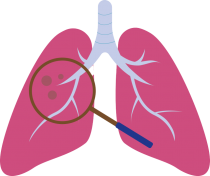Tuberculosis
Tuberculosis is a disease caused by a bacterium called koch’s bacillus which spreads quickly through the air from one sick person to another.
It primarily affects malnourished people or those with an immune deficiency (a drop in the body’s natural defences), for example caused by a disease (hiv/aids in particular).

Symptoms
- Violent and persistent coughing fits, sometimes accompanied by bloody sputum.
- High- or low-grade fever.
- General fatigue, loss of appetite and weight.
- Difficulty breathing.
- Night sweats.
Modes of transmission
- Whenever they cough, sneeze, speak or spit, people with TB in their lungs project micro-droplets into the air that contain germs causing the disease.
- If the sick person is untreated, they can infect an average of 10 to 15 people in a single year.
Disease progression
There are two forms of tuberculosis :
PRIMARY TB INFECTION
- If there are no symptoms, it usually goes unnoticed.
- When it is stopped by the immune system's defences, the infection generally results in a natural recovery.
- However, 5 to 10% of infected people develop the disease or become contagious, and sometimes several years after infection, during which the infection may remain latent in the body.
TUBERCULOSIS DISEASE
- This is very serious, as the infection attacks the lungs and can spread to other organs, resulting in death if it is not correctly treated.
- Treatment involves taking anti-TB drugs regularly and consistently for an average of 6 to 8 months. Regular monitoring by healthcare workers is essential.
- At the start of treatment, the person should be isolated for as long as they are contagious (bacteria is present in their sputum).
Preventative measures
There is a tuberculosis vaccine. It is recommended the vaccine be given from birth.
Find out more
Each year, 1.5 million people die of tuberculosis and this figure has been increasing year-on-year (2018)
Tuberculosis is caused by a bacterium known as Koch's bacillus. Is the development of drug-resistant forms of TB a major problem in the fight against tuberculosis? These forms are usually found in people who have been infected and have not consistently taken the medication prescribed by healthcare workers.
.